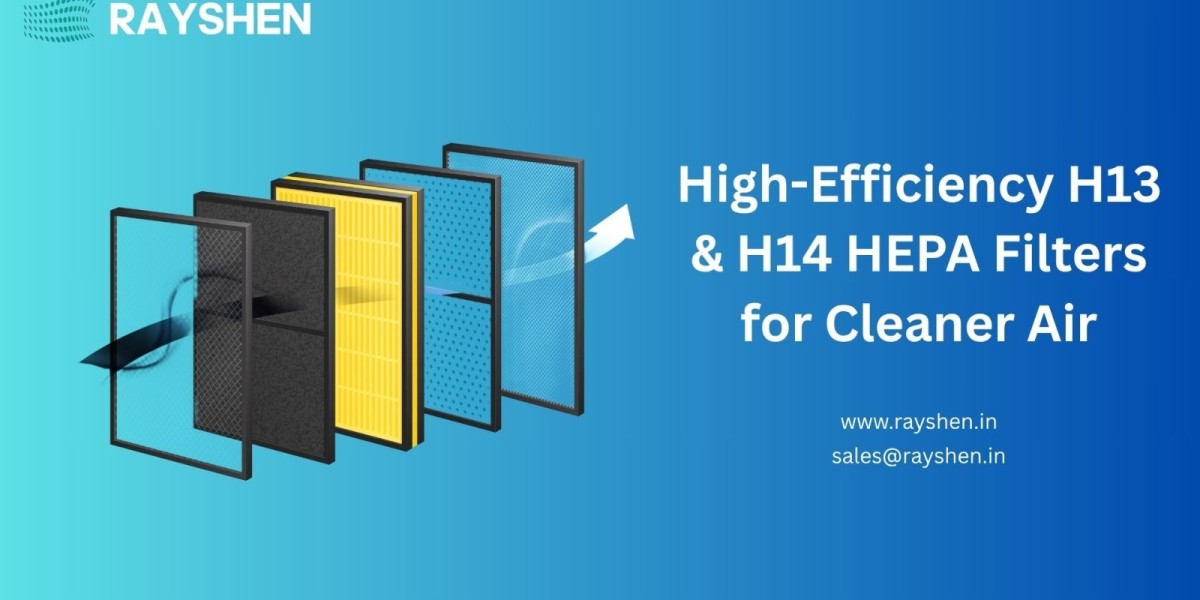A HEPA filter plays a crucial role in maintaining a clean, hygienic, and contaminant-free environment. Whether used in clean rooms, laboratories, hospitals, pharmaceutical units, or even in homes, HEPA filters are one of the most trusted air filtration solutions in the world. These filters ensure that the air you breathe—or the air circulating inside your controlled workspace—is free from bacteria, dust, microparticles, and other airborne contaminants.
At Rayshen Environmental Pvt. Ltd., we manufacture high-quality HEPA filters designed for clean rooms, FFUs, HVAC systems, biosafety cabinets, and many other controlled-environment applications. You can explore them here: https://rayshen.in/hepa-filter/.
This guide explains everything you need to know about HEPA filters—how they work, where they’re used, and why they are essential for both clean room and home applications.
What Is a HEPA Filter?
A HEPA filter (High Efficiency Particulate Air filter) is a specialized air filtration device capable of trapping 99.97% of particles as small as 0.3 microns. This includes bacteria, viruses, dust mites, pollen, mold spores, smoke particles, and other harmful contaminants.
HEPA filters are classified mainly into H13 and H14 grades:
H13 HEPA filter – Captures 99.95% particles
H14 HEPA filter – Captures 99.995% particles
These filters are widely used in industries where air purity is critical, such as pharmaceuticals, electronics manufacturing, medical labs, and food processing.
How Does a HEPA Filter Work?
HEPA filters are not ordinary filters. They use a multi-layer fiberglass structure that traps particles using three scientific mechanisms:
1. Interception
Small particles flowing through the air come close to the filter fibers and get stuck.
2. Impaction
Larger particles cannot change direction quickly during airflow, so they collide directly with the fiber.
3. Diffusion
Ultra-fine particles move randomly and eventually stick to the fibers due to microscopic air resistance.
Together, these methods make the HEPA filter one of the most efficient filtration systems in the world.
Types of HEPA Filters Used in Clean Rooms
In clean room environments, high-precision air quality is mandatory. At Rayshen Environmental Pvt. Ltd., we provide two major types of HEPA filters:
1. Mini-Pleat HEPA Filter
Compact and lightweight
High airflow capacity
Used in FFUs, air showers, clean room equipment
2. Box-Type HEPA Filter
Strong and durable
Suitable for large HVAC and duct systems
Commonly used in pharmaceutical and industrial clean rooms
Each filter is designed to deliver maximum efficiency while maintaining low pressure drop, ensuring stable clean room performance.
Why HEPA Filters Are Important in Clean Rooms
Clean rooms require controlled air quality to prevent contamination. Even a single particle can affect product quality, especially in industries like pharmaceuticals or microelectronics.
Key benefits of using HEPA filters in clean rooms:
Ensures ISO-certified clean air quality
Protects equipment and sensitive processes
Maintains sterility in pharmaceutical production
Reduces airborne microbes and contamination risks
Works efficiently with FFUs, air showers, and HVAC systems
Rayshen’s HEPA filters are manufactured with strict quality standards to ensure long-lasting and consistent air purification.
HEPA Filters for Home Use
Today, many households and offices use air purifiers equipped with HEPA filters. They help improve indoor air quality and protect against pollutants, allergens, and airborne diseases.
Benefits for home users:
Removes dust, smoke, and pet dander
Controls pollen and allergens
Helps asthma and allergy patients
Reduces the spread of airborne infections
Improves overall indoor air quality
Whether in a residential or commercial space, HEPA filters create a healthier breathing environment.
Where Are HEPA Filters Used?
HEPA filters are essential in various sectors. Some common applications include:
Clean rooms (ISO 5, ISO 6, ISO 7, ISO 8)
Pharmaceutical and biotech industries
Hospitals and operation theatres
Food and beverage manufacturing
Electronics and semiconductor plants
Air purifiers and HVAC systems
Biosafety cabinets and laminar flow units
FFUs (Fan Filter Units)
Laboratories and research centers
Their versatility makes them suitable for both industrial and home environments.
How to Choose the Right HEPA Filter?
When selecting a HEPA filter, consider the following points:
Efficiency grade: H13 or H14, depending on your clean room requirements
Size and airflow rate: Must match your FFU or HVAC system
Type of construction: Mini-pleat or box type
Pressure drop: Lower is better for energy efficiency
Application area: Clean room, lab, or home
If you need support choosing the right model, Rayshen’s technical team can help you select the best filter for your setup.
Why Choose Rayshen HEPA Filters?
Rayshen Environmental Pvt. Ltd. offers premium-quality HEPA filters designed for long-lasting performance and maximum filtration efficiency.
Key features of Rayshen HEPA filters:
High dust-holding capacity
Low-pressure drop for efficient airflow
Available in H13 and H14 grades
Durable construction and reliable performance
Suitable for all clean room standards
Custom sizes available on request
Conclusion
A HEPA filter is an essential component for ensuring clean, safe, and contaminant-free air in both professional and home environments. Whether you are setting up a clean room, upgrading your FFU system, or improving indoor air quality at home, choosing a high-quality HEPA filter is crucial for long-term performance.
With advanced manufacturing and strict quality controls, Rayshen Environmental Pvt. Ltd. provides reliable HEPA filtration solutions that meet global air purity requirements.






